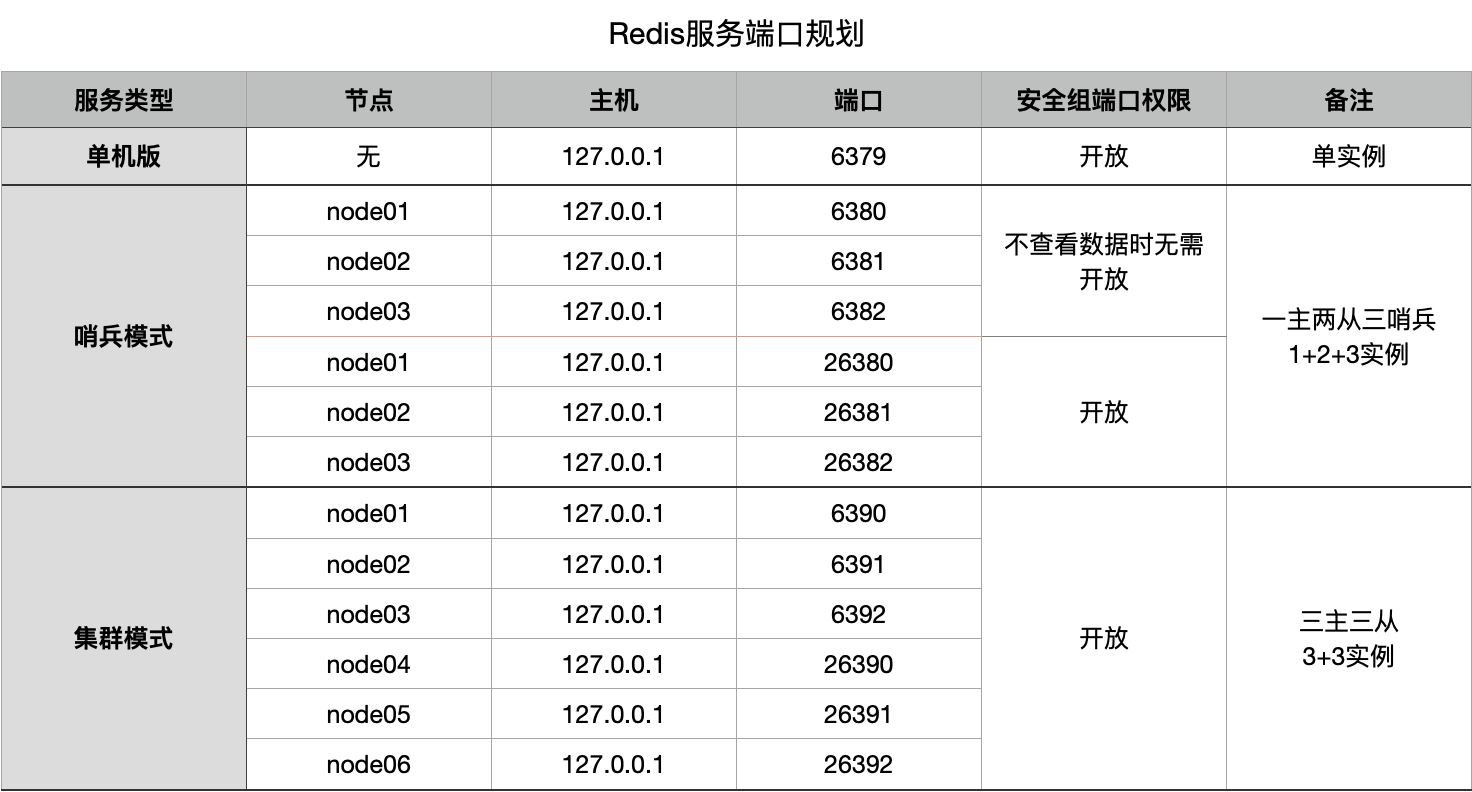一、序言
Redis高可用有两种模式:哨兵模式和集群模式,本文基于哨兵模式搭建一主两从三哨兵Redis高可用服务。
1、目标与收获
一主两从三哨兵Redis服务,基本能够满足中小型项目的高可用要求,使用Supervisor监控并管理Redis实例。通过本文将完成如下目标:
哨兵模式服务规划与搭建
哨兵模式服务相比于单机版服务更加可靠,适合读写分离、数据量不是很大、要求可靠稳定性的场景。
客户端整合与读写分离
通过Spring框架对哨兵模式进行连接,完成生产环境的常见操作。
2、端口规划
端口规划是完成本方案的第一步。

二、单机模拟
单机模拟是在一台物理机或虚拟机上模拟操作,以尽可能还原本方案中间过程,通常用于学习或开发阶段。
为了简化操作,Redis服务做如下约定:数据不持久化到磁盘;服务实例以前台进程方式运行;节点的配置文件以默认配置文件为模版;无密码验证。
(一)服务规划
1、Redis实例
服务在第一次启动时明确知道第几个节点是master节点,当服务在长期运行并发生主从切换时,无法显示知道第几个节点是master节点,需要通过命令行间接查询。
| 节点 | 主机 | 端口 | 角色 | 额外配置 |
|---|---|---|---|---|
| node01 | 127.0.0.1 | 6380 | 第一次启动时作为master服务 | |
| node02 | 127.0.0.1 | 6381 | 第一次启动时作为slave服务 | replicaof 127.0.0.1 6380 |
| node03 | 127.0.0.1 | 6382 | 第一次启动时作为slave服务 | replicaof 127.0.0.1 6380 |
额外配置指第一次启动Redis服务实例时,节点配置文件中新增配置。
2、哨兵服务
哨兵服务节点之间没有主从的区别,所有节点处于平等地位。当主服务出现异常时,哨兵服务会触发投票策略,从Redis实例的从节点中选择候选人作为新的主服务。
| 节点 | 主机 | 端口 | 额外配置 |
|---|---|---|---|
| node01 | 127.0.0.1 | 26380 | sentinel monitor mymaster 127.0.0.1 6380 2 |
| node02 | 127.0.0.1 | 26381 | sentinel monitor mymaster 127.0.0.1 6380 2 |
| node03 | 127.0.0.1 | 26382 | sentinel monitor mymaster 127.0.0.1 6380 2 |
(二)服务配置
1、Redis实例
节点的初始配置文件以默认配置文件为模版。
node01、node02初始化配置文件之后,显示指明节点间的主从关系,增加如下配置:
replicaof 127.0.0.1 6380
2、哨兵服务
节点的初始配置文件以默认配置文件为模版。
node01、node02、node03初始化配置文件后,增加如下配置:
sentinel monitor mymaster 127.0.0.1 6381 2
(三)服务管理
测试或者学习时,建议采用前台进程管理服务,便于模拟单点故障、查看日志观察主从切换。
生产条件下建议使用Supervisor管理服务,不仅易于管理而且能够实现服务异常终止后自动重启。高可用场景下使用的是三台物理机。
1、Redis实例
/usr/local/redis/bin/redis-server /usr/local/redis/conf/ms/redis80.conf --port 6380 --save '' --daemonize no /usr/local/redis/bin/redis-server /usr/local/redis/conf/ms/redis81.conf --port 6381 --save '' --daemonize no /usr/local/redis/bin/redis-server /usr/local/redis/conf/ms/redis82.conf --port 6382 --save '' --daemonize no
2、哨兵服务
/usr/local/redis/bin/redis-sentinel /usr/local/redis/conf/ms/sentinel280.conf --port 26380 --daemonize no /usr/local/redis/bin/redis-sentinel /usr/local/redis/conf/ms/sentinel281.conf --port 26381 --daemonize no /usr/local/redis/bin/redis-sentinel /usr/local/redis/conf/ms/sentinel282.conf --port 26382 --daemonize no
三、客户端整合
客户端实现是指基于SpringBoot的整合分为两步实现:一是完成作为基础的整合;二是结合生产需要补充新特性。
(一)基础整合
基础整合的内容是以Java客户端连接高可用哨兵模式Redis服务,实现单节点故障服务正常运行的要求。
1、全局配置文件
全局配置文件添加的配置信息有:master参数为哨兵服务名,此处为默认值;nodes参数为哨兵服务列表(不是Redis实例服务列表);database参数为数据库。
spring:
redis:
database: 0
sentinel:
nodes: 192.168.181.171:26380,192.168.181.171:26381,192.168.181.171:26382
master: mymaster2、集成配置
集成进SpringBoot体系,最核心的是创建LettuceConnectionFactory连接工厂,通过Redis连接工厂,能够顺利继承进Spring体系下其他框架。
@Configuration
public class RedisSentinelConfig {
@Autowired
private RedisProperties redisProperties;
@Bean
public RedisConnectionFactory lettuceConnectionFactory() {
RedisProperties.Sentinel sentinel = redisProperties.getSentinel();
HashSet<String> nodes = new HashSet<>(sentinel.getNodes());
String master = sentinel.getMaster();
RedisSentinelConfiguration config = new RedisSentinelConfiguration(master, nodes);
config.setDatabase(redisProperties.getDatabase());
return new LettuceConnectionFactory(config);
}
}(二)读写分离
基础整合仅仅是实现了高可用Redis服务的流程,生产环境下仍需要增加其他配置:修改自定义连接数据库序号;授权连接;连接池配置;读写分离。
在高可用前提下,衍生出读写分离的特性,主库完成写请求;从库完成读请求(从库不允许写)。
@Bean
public LettuceClientConfigurationBuilderCustomizer lettuceClientCustomizer() {
// 配置读写分离
return builder -> builder.readFrom(ReadFrom.REPLICA);
}以上是Redis哨兵模式高可用的示例分析的详细内容。更多信息请关注PHP中文网其他相关文章!
 REDIS与数据库:性能比较May 14, 2025 am 12:11 AM
REDIS与数据库:性能比较May 14, 2025 am 12:11 AMRedisoutperformstraditionaldatabasesinspeedforread/writeOperationsDuetoitsin-memorynature,niletraditionalditionalditionalditationaldatabasesexcelcelincomplexqueriessanddaintegrity.1)redisisisisideSidealForrealForreal-timeanalyticsanticanticanticanticanticantic.2)
 我什么时候应该使用redis代替传统数据库?May 13, 2025 pm 04:01 PM
我什么时候应该使用redis代替传统数据库?May 13, 2025 pm 04:01 PM用户edisinsteadofatraditionaldatabasewhenyourapplicationrequirespeedandreal-timedataprocorsing,sueAsAsforCaching,sessionmanagement,orrereal-timeanalytics.redisexcelsin:1)caching,缓存,减少载荷载量
 REDIS:超越SQL- NOSQL的观点May 08, 2025 am 12:25 AM
REDIS:超越SQL- NOSQL的观点May 08, 2025 am 12:25 AMRedis超越SQL数据库的原因在于其高性能和灵活性。1)Redis通过内存存储实现极快的读写速度。2)它支持多种数据结构,如列表和集合,适用于复杂数据处理。3)单线程模型简化开发,但高并发时可能成瓶颈。
 REDIS:与传统数据库服务器的比较May 07, 2025 am 12:09 AM
REDIS:与传统数据库服务器的比较May 07, 2025 am 12:09 AMRedis在高并发和低延迟场景下优于传统数据库,但不适合复杂查询和事务处理。1.Redis使用内存存储,读写速度快,适合高并发和低延迟需求。2.传统数据库基于磁盘,支持复杂查询和事务处理,数据一致性和持久性强。3.Redis适用于作为传统数据库的补充或替代,但需根据具体业务需求选择。
 REDIS:功能强大的内存数据存储的简介May 06, 2025 am 12:08 AM
REDIS:功能强大的内存数据存储的简介May 06, 2025 am 12:08 AMRedisisahigh-performancein-memorydatastructurestorethatexcelsinspeedandversatility.1)Itsupportsvariousdatastructureslikestrings,lists,andsets.2)Redisisanin-memorydatabasewithpersistenceoptions,ensuringfastperformanceanddatasafety.3)Itoffersatomicoper
 Redis主要是数据库吗?May 05, 2025 am 12:07 AM
Redis主要是数据库吗?May 05, 2025 am 12:07 AMRedis主要是一个数据库,但它不仅仅是数据库。1.作为数据库,Redis支持持久化,适合高性能需求。2.作为缓存,Redis提升应用响应速度。3.作为消息代理,Redis支持发布-订阅模式,适用于实时通信。
 REDIS:数据库,服务器还是其他?May 04, 2025 am 12:08 AM
REDIS:数据库,服务器还是其他?May 04, 2025 am 12:08 AMredisisamultifaceTedToolThatServesAsAdatabase,server和more.itfunctionsasanin-memorydatastrustore,supportsvariousDataStructures,and CanbeusedAsacache,MessageBroker,sessionStorage,sessionStorage,sessionstorage,andford forderibedibedlocking。
 REDIS:揭示其目的和关键应用程序May 03, 2025 am 12:11 AM
REDIS:揭示其目的和关键应用程序May 03, 2025 am 12:11 AMRedisisanopen-Source,内存内部的库雷斯塔氏菌,卡赫和梅斯吉级,excellingInsPeedAndVersatory.itiswidelysusedforcaching,Real-Timeanalytics,Session Management,Session Managements,and sessighterboarderboarderboardobboardotoitsssupportfortfortfortfortfortfortfortfortorvortfortfortfortfortfortforvortfortforvortforvortforvortfortforvortforvortforvortforvortdatastherctuct anddatataCcessandcessanddataaCces


热AI工具

Undresser.AI Undress
人工智能驱动的应用程序,用于创建逼真的裸体照片

AI Clothes Remover
用于从照片中去除衣服的在线人工智能工具。

Undress AI Tool
免费脱衣服图片

Clothoff.io
AI脱衣机

Video Face Swap
使用我们完全免费的人工智能换脸工具轻松在任何视频中换脸!

热门文章

热工具

禅工作室 13.0.1
功能强大的PHP集成开发环境

Atom编辑器mac版下载
最流行的的开源编辑器

VSCode Windows 64位 下载
微软推出的免费、功能强大的一款IDE编辑器

安全考试浏览器
Safe Exam Browser是一个安全的浏览器环境,用于安全地进行在线考试。该软件将任何计算机变成一个安全的工作站。它控制对任何实用工具的访问,并防止学生使用未经授权的资源。

SublimeText3 Mac版
神级代码编辑软件(SublimeText3)






